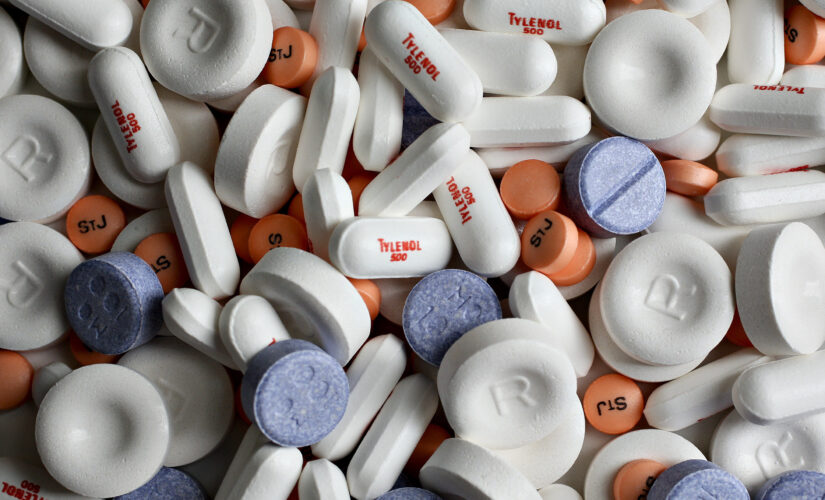NEWYou can now listen to Fox News articles!
Daily aspirin to prevent heart disease and stroke, also known as cardiovascular disease (CVD) is no longer recommended for those over 60 years old, according to new guidance from the US Preventive Service Task force (USPSTF) released Tuesday.
The panel of national experts released a statement report that reversed its standard guidance citing a slightly increased risk of internal bleeding after taking the medication daily. The report stated that although aspirin reduces the risk of cardiovascular events, it increases the risk for gastrointestinal bleeding, intracranial bleeding, and hemorrhagic stroke.
Johnson & Johnson’s Tylenol aspirin in boxes.
(Valerie Plesch/Bloomberg via Getty Images)
“Based on current evidence, the Task Force recommends against people 60 and older starting to take aspirin to prevent a first heart attack or stroke,” Task Force vice chair Michael Barry said in a news release. Barry, who is also a professor of medicine at Harvard Medical School and a clinician at Massachusetts General Hospital, added, “Because the chance of internal bleeding increases with age, the potential harms of aspirin use cancel out the benefits in this age group.”
NEARLY 200 CASES OF MYSTERY LIVER DISEASE IN CHILDREN: OFFICIALS
The recent statement by the USPSTF comes nearly two decades after the Food and Drug Administration (FDA) recommended that aspirin should not be taken to prevent a first heart attack or stroke.
Images of Johnson & Johnson Aspirin tablets, Motrin Junior Strength tablets, Tylenol Extra Strength caplets are displayed for a photograph in New York, U.S., on Friday, Jan. 15, 2010.
(Daniel Acker/Bloomberg via Getty Images)
According to the FDA website, aspirin is an over the counter pain-killing drug that is commonly used for prevention of blood clots, heart attacks and other conditions because of its ability to lower the clotting action of the blood’s platelets. But the federal agency did state that the drug’s same properties that help stop blood from clotting may cause unwanted side effects, such as stomach bleeding, bleeding in the brain, kidney failure, and other kinds of strokes. The website stated, “There may be a benefit to daily aspirin use if you have some kind of heart or blood vessel disease, or if you have evidence of poor blood flow to the brain. But only a doctor can tell you whether the risks of long-term aspirin use may be greater than the benefits.”
While the USPSTF report did not recommend a daily dose of aspirin for those 60+ years of age, it did recommend daily use of aspirin for individuals 40 – 59 years old with an estimated 10% or greater risk for cardiovascular disease who are not at risk for bleeds and who consult a doctor.
STAYING HYDRATED MAY LOWER RISK OF HEART FAILURE, STUDY SAYS
The report from the panel of experts stated, “The decision to initiate low-dose aspirin use for the primary prevention of CVD in adults aged 40 to 59 years who have a 10% or greater 10-year CVD risk should be an individual one. Evidence indicates that the net benefit of aspirin use in this group is small. Persons who are not at increased risk for bleeding and are willing to take low-dose aspirin daily are more likely to benefit.”
Task Force member John Wong, M.D. said in a news release, “People who are 40 to 59 years old and who don’t have a history of CVD but are at higher risk may benefit from starting to take aspirin to prevent a first heart attack or stroke.” Wong who is also a professor of medicine at Tufts University School of Medicine also said, “It’s important that they decide together with their healthcare professional if starting aspirin is right for them because daily aspirin use does come with possible serious harms.”
Pain relief medicine at a pharmacy.
(John Greim/LightRocket via Getty Images)
According to the report, CVD accounts for more than 1 in 4 deaths and is the leading cause of mortality in the US. They also said an estimated 605,000 Americans have a first heart attack and approximately 610,000 experience a first stroke each year.
The panel also stated these revised recommendations are not for individuals who already have had a stroke or currently have heart disease, or are already taking aspirin. The report said those patients should speak with their healthcare provider about their particular case.
CLICK HERE TO GET THE FOX NEWS APP
“We want to emphasize that these recommendations are focused on starting aspirin to prevent
a first heart attack or stroke. Anyone who already takes aspirin and has questions about it should speak with their healthcare professional,” Wong said in the release.




